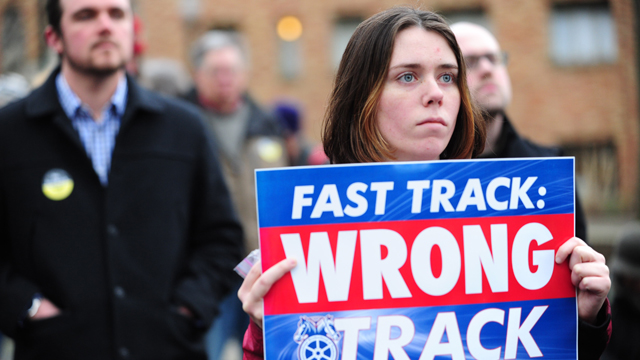This post first appeared at The Baseline Scenario.

A protester holds a sign against the fast-track authority for the TPP during a protest in Portland, Oregon, on Jan. 31, 2014. (Photo by Alex Milan Tracy/NurPhoto/Sipa USA)
The Obama administration is lobbying hard for Congress to pass a trade promotion authority (TPA) and to quickly approve the Trans-Pacific Partnership (TPP), a free trade agreement that is on the verge of being finalized.
The administration and its supporters on this issue, including leading Republicans, argue that the case for TPP rests on basic economic principles and is only strengthened by the findings of modern research. On both counts their claims are greatly exaggerated — particularly with regard to the notion that more trade, on these terms, is necessarily better for the United States.
There is a strong theoretical and empirical case — dating back to David Ricardo in 1817 — that freer trade should make countries better off. However, modern-day trade agreements, including those currently being negotiated, are very different from earlier experiences with trade liberalization.
The TPP is not only — perhaps not even mostly — about freer trade, and thus who gains and who loses is very much dependent on what exactly are the details of the agreement. The exact nature of the provisions matters and at this point, because the TPP text is not available to the public, we cannot be sure whom this trade agreement will help or hurt within the United States or elsewhere.
Outside of agriculture, international trade is already substantially liberalized, and thus the gains from further reductions in tariffs are most likely limited by the fact that tariffs are already quite low.
And the scope of modern-day trade agreements has expanded — primarily into areas in which the economic theory case for mutual benefits is far from clear.
Perhaps the most prominent example is intellectual property rights (IPRs), including patents. Contrary to the mutual benefits of international trade in general, there is no clear-cut theoretical case that stronger enforcement of IPRs will benefit all parties.
In the world in which the developing countries can imitate technologies of developed countries, improving intellectual property rights protection in developing countries is actually likely to make them worse off. This is intuitive: ignoring the developed countries’ IPRs allows developing countries to adopt better technologies faster, increasing welfare there. In the case of medicines, for example, forcing lower income countries to fully respect all patents will mean more expensive treatments and less access to life-saving drugs.
What is more, it may even be the case that the developed countries themselves will benefit from weaker IPRs in the poorer countries (though of course this is not a necessary outcome). This is because poorer countries tend to have lower wages, and as production shifts to the poor countries due to imitation, prices paid by rich countries’ consumers fall. Helpman (1993) contains the modern classic exposition of these results. (Precise references to the research cited here are at the end of this article.)
The second example is provisions that require liberalization of inward investment in oligopolistic industries. For instance, recent US trade agreements with Central America/Dominican Republic, Peru, Panama, and Colombia contain specific clauses liberalizing investment in the financial services industry (as well as government procurement and investment more broadly). Again, the theoretical case that these provisions will be mutually beneficial is not straightforward.
For instance, if an industry is uncompetitive, countries may gain from retaining the domestic oligopolistic firms. Entry by foreign firms may not increase competition but instead primarily result in transferring the profits abroad. Brander and Spencer (1985) develop these ideas for cross-border trade; a recent paper by Fiorini and LeBrand (2015) focuses on inward investment by foreign firms.
The third example is the potential for a negative impact of international trade on the quality of domestic institutions. The standard argument for mutual gains from trade assumes that international exchange of goods does not lead to changes in the institutional environment — including who has secure property rights (as in land), as well as enforceable rights as a worker (including occupational safety standards).
There have been historical episodes in which trade booms led to worse institutional outcomes, such as property expropriation by elites. Do and Levchenko (2009) develop a theoretical model of one possible mechanism for such an effect. Historical instances of this include the cotton boom in Central America (Do and Levchenko, 2006), and sugar in the Caribbean (Dippel, Greif, and Trefler, 2015).
To be clear, we are not saying that this is a likely impact of TPP. But it is a possible impact of any free trade agreement (or other form of trade liberalization). This only confirms the point that the details matter in terms of determining who does well and who may do very badly.
We remain confident that there is a potential TPP that could be negotiated that would involve gains for all trading partners. But whether this is the case depends completely on the specific rules that are being written.
Given that these rules are secret (from us), we have no way of judging what is or is not in the TPP. Congress will vote soon on TPA, to greatly increase the odds of passing TPP, without there being first a proper public discussion of the TPP details. This is not a triumph of democracy — and it is not likely to lead to better economic policymaking.



